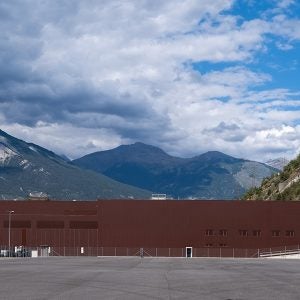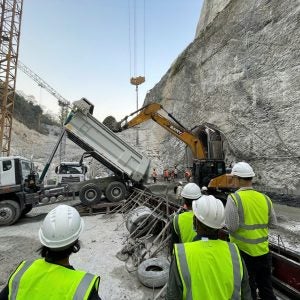The European Investment Bank (EIB) has granted a EUR55M loan to the Federal Democratic Republic of Nepal to finance the construction and operation of the 140MW Tanahu hydropower plant.
The finance contract was signed yesterday in Kathmandu by EIB Vice-President Magdalena Álvarez and Nepalese Finance Secretary, Shanta Raj Subedi. The signing took place exactly one year after the signature of the Framework Agreement between the EIB and Nepal.
EIB Vice-President Magdalena Álvarez Arza, who is responsible for the Bank’s operations in Asia, highlighted that the EIB "is delighted to see that its first loan to Nepal will eventually provide clean power to the country allowing households to enjoy electrical light, children to read after dark, hospitals and schools to function and entrepreneurs to invest and create jobs." She added that "this loan shows our firm commitment to contribute to a stronger and sustainable dynamism of the Nepalese economy".
Dr. Alexander Spachis, Ambassador, Head of the European Union Delegation to Nepal, emphasised that the involvement of EIB in Nepal’s economic development will yield positive results in the long run, allowing citizens to experience a significant improvement in their living standards. "Since energy is the key to speeding up social and economic development, the present EIB loan will contribute to help Nepal achieve its development goals in the next couple of years."
The Tanahu plant will be built on the Upper Seti River, Tanahu District, in the central part of Nepal. The project will contribute to meet peak electricity demand in Nepal during the dry winter season when the shortages are more acute and will operate as a base load power plant during the remaining period of the year. It will also generate significant economic benefits by providing a clean and reliable supply of electricity and will contribute to reduce the adverse impacts of climate change by displacing more polluting energy sources.
In addition, the project ensures that environmental and social impacts are addressed. The project includes a programme of rural electrification to supply power to 17 villages in the vicinity of the plant. A Community Development programme will be implemented for people living in the area, addressing education, health, gender development, social inclusion, economic development and livelihood activities.
The project will be co-financed by the Asian Development Bank (ADB), the Japan International Cooperation Agency (JICA) and the Abu Dhabi Fund for Development. The EIB funding represents 15% of the total cost of the project.






